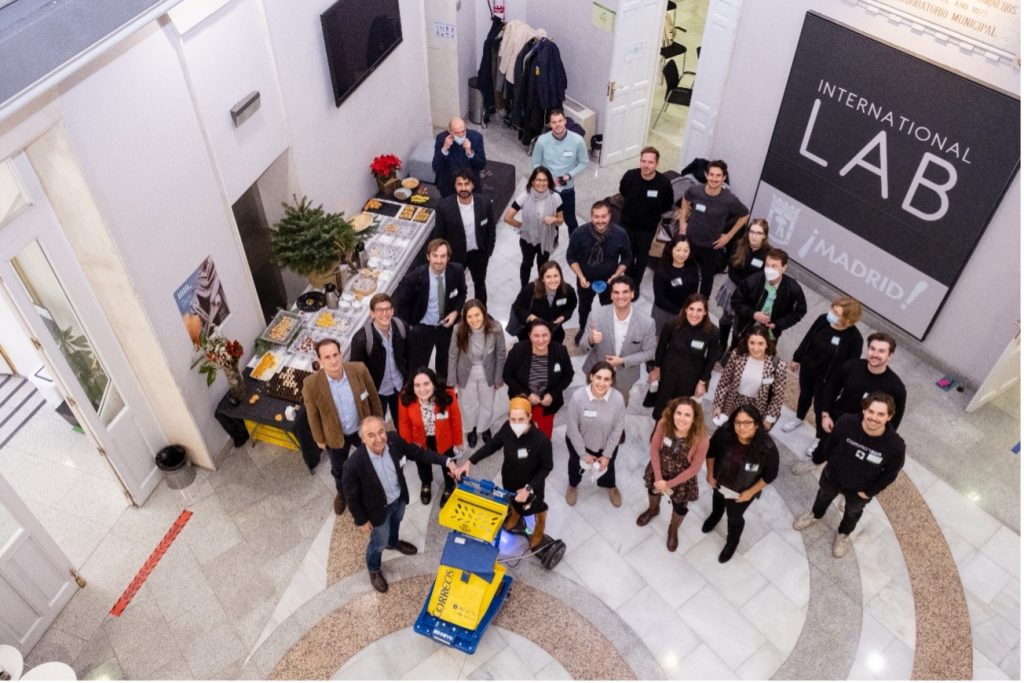Technological innovation at the service of cities to make them more sustainable

Last Tuesday, December 14, the Demo Day Madrid took place within the framework of the Clean Cities ClimAccelerator program, the new accelerator of the European Union, led by the Universidad Politécnica de Madrid and Impact Hub Vienna and supported by Climate KIC.
The event, which took place at the Madrid International Lab, served as the closing of the second stage of the program, in which a total of 15 start-ups have gone through a period of “Collaboration”, after an initial phase focused on “ Validation”. In this way, the Demo Day sought to bring together start-ups in the same event, together with Spanish corporates, investors and partners, among which are the City Hall of Madrid, Ferrovial, the Distrito Castellana Norte and La Pinada. The Demo Day Madrid marked the end of this stage 2, in which the entrepreneurs have been working on developing their proof of concept, focusing on solving real problems presented by the entities participating in the initiative.
The day also had the participation of Ángel Niño, Councilor for Innovation and Entrepreneurship of the Madrid City Council, who underlined during his speech the importance of directing technological innovation towards the sustainability of cities. He was accompanied in the welcome by Thomas Osdoba, on behalf of Climate KIC, Claudio Feijóo, Delegate of the Rector for Entrepreneurship at UPM and Julio Lumbreras, as representative of itd UPM. The three agreed on the role of cities to accelerate the energy transition and move towards decarbonized urban models, more sustainable and habitable for the citizen.
For her part, the keynote conference was given by María Mendiluce, CEO of “We Mean Business Coalition”, a global non-profit coalition that works with the most influential companies to act against climate change and accelerate the transition to a fair economy and resilient with zero net emissions. María, who has more than 25 years of experience in topics related to sustainable development, energy and climate action, focused her presentation on the route that is being taken for greater sustainability in 2030, highlighting the different strategies that are being applied for a future more aligned with the environment.
And since it could not be missed, the long-awaited time came for the “Pitch” of the start-ups that participate in the accelerator. Five minutes to present the current status of their projects and the progress they have made in recent months. This was followed by the “1-to-1 meetings” between start-ups and investors and corporates, a unique opportunity to go deeper into their projects and generate synergies and potential future collaborations.
Finally, there was a round table moderated by Arístides Senra, Director of Innovation and Entrepreneurship from the UPM, which had the participation of Cristina Rodríguez Vilariño, Technical Analyst of Entrepreneurship opportunities at Enagás Emprende, Ania Klimowitz Investment Manager at Axon Partners Group, and Luis César Castañeda, Principal at Axon Partners Group. Under the title ‘’Investors vs Startups: how the startups can scale up’’, the table managed to generate an active debate between all the participants and the start-ups on how to scale projects, as well as on different investment channels.
With the Demo Day Madrid this second stage of the accelerator closes, and those start-ups that manage to reach stage 3 (only five of them, those that have achieved a higher degree of maturity in their projects) will focus on generating “Impact’’, what translates into they must work to transfer these models already validated in real transactions with clients and investors, landing their products and services even in new markets.
Further information:
